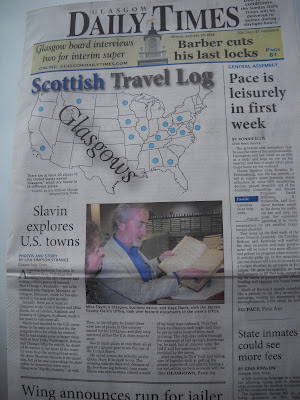I decide I will have breakfast in Dresden, so as to make an early start in the courthouse.
I have noticed, from time-to-time, in roadside fields, some very large donkeys. I come up behind one in a trailer at traffic lights. It's simply enormous close up, and the penny finally drops: it's a mule.
The cafe on the courthouse square has pictures of mules on the wall

[n0759]
I ask the waitress. They show them off at the county show. These are from "Belgian" horses, you know, like Clydesdales and Shires: that's why they're so big. There is also a picture of the old courthouse, which burned down in 1948, so there may not be any records left at all.
In the courthouse, the grown-up ladies of the recorder's department scramble into action, as good as any wartime squadron. My thesis is that the store that used to exist at the junction was, at one time, owned by one of the Glasgows in the cemetery up the road. The cemetery records show two graves at Lebanon Church, with names for both. The names I didn't know were Lube A., 1887-1959, Lula Bowlin 1889-1929, and Etta Moore 1890-[still alive in 1980 - they do that, they put their names and birth year on gravestones; it's either macabre or Scottish): an interesting menage-a-trois to speculate about.
The Tax Assessor gives me the parcel number of the plot where the store used to be, so it's time to track back through the deed books. I have the name of the lady who used to own it, so I will get an early check of whether I'm on the right track.
It is a matter of considerable surprise to me that all the counties in all the states that I've visited all keep their old records the same way (their computerisations are very different). I am in a room like all the others I've been in, with the same heavy, leather and canvas-bound books
It's a slow process, not least because quite a lot of people tried to make a go of the place in the 50s and 60s for short periods. But, eventually, back in 1918, Lube and Lula Glasgow bought it. They bought it for $1500, and sold it in 1927 for just over $1000. Lube must have been gifted with the second sight, for his purchaser sold it only four years later for just $600. In fact, Lube bought a lot of land in 1917, including some from the Glasgow in the other grave.
Then, armed with all the names, it's round to my other favourite place, the main library. I stood the ladies down, but I'm sure they phoned a warning ahead. The librarian squadron were poised for action.
Weakley County was formed in 1823, and they produced a 175th anniversary history partly in the form of family biographies submitted by family members. It has been well-indexed, and is simply full of Glasgows. It looks like they might all be related to one of the first settlers here.
But what's exciting is that there is actually a picture of Lube

[n0770]
Already a JP by 1918, in the early 30s he had become the first Executive Director of the Agricultural Stabilisation and Conservation Service (remember, we're in the middle of the Great Depression, The Tennessee Valley Authority has just been created, and we're in Western Tennessee). By 1936 he's vice-president of one of the local banks, becoming president in 1955.
You'd think they'd be happy to keep his name. I wonder why they didn't?
Later that night, I contemplated having a longer rest. But I drove up, knowing Silver would keep me moderate. I had no sooner sat down with my beer (domestic by the bottle) than a man my age (I think) came over and insisted I play pool. Of course, having told him I was no good at it, I won. A group of young men came in, looking to play. One had so much metal in his face, he looked like he might have been a nail-bomb victim. He was wearing tartan trousers. He asked about my accent, and said they were from Ireland, but had been here so long they'd lost their accents. I misunderstood and asked how long that was. Turned out to be several generations.
On the way back, a whole herd of deer crossed the highway (this is the middle of town) in front of the van in front of me. He didn't seem to brake at all.



























